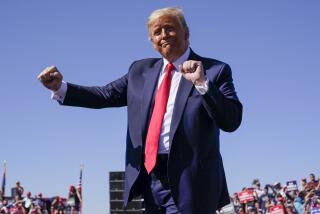Tom Petty’s family wants Trump to stop playing ‘I Won’t Back Down’ at rallies

Will the Trump campaign “back down”? The family of Tom Petty says a legal notice has been filed after the rocker’s song “I Won’t Back Down” was played prominently at the Trump rally Saturday in Tulsa, Okla.
“Trump was in no way authorized to use this song to further a campaign that leaves too many Americans and common sense behind,” said a statement on Twitter signed Saturday by Petty’s daughters Adria and Annakim, his widow, Dana, and ex-wife Jane.
They continued: “We would hate for fans that are marginalized by this administration to think we were complicit in this usage. Concurrently, we have issued an official cease and desist notice to the Trump campaign.”
The Petty family is unlikely to get anywhere with the request, however, due to licensing agreements that allow campaigns to use a vast array of songs. For example, “You Can’t Always Get What You Want” by the Rolling Stones was also featured Saturday, years after the band gave up trying to get the campaign to stop playing it.
In America, Mick Jagger said in 2016, “If you’re in a public place like Madison Square Garden ... you can play any music you want and you can’t be stopped.”
While Jagger seemed to refer to venue licenses, the American Society of Composers, Authors and Publishers, or ASCAP, also offers a Political Campaign License agreement that provides “a blanket license to perform any or all of the millions of compositions in the ASCAP repertory.”
However, ASCAP members can ask that specific songs be excluded from a particular campaign’s license. Artists, or their estate, still might be able to pursue legal action on the grounds of false endorsement or trademark confusion.
This is not the Tom Petty story that I intended to write.
“As a general rule, a campaign should be aware that, in most cases, the more closely a song is tied to the ‘image’ or message of the campaign, the more likely it is that the recording artist or songwriter of the song could object to the song’s usage by the campaign,” ASCAP says.
“Tom wrote this song for the underdog, for the common man and for EVERYONE,” Petty’s family said in the tweeted statement. “We want to make it clear that we believe everyone is free to vote as they like, think as they like, but the Petty family doesn’t stand for this. We believe in America and we believe in democracy. But Donald Trump is not representing the noble ideals of either.”
Neither the president nor his campaign has addressed the issue on their various social media accounts.
More to Read
The biggest entertainment stories
Get our big stories about Hollywood, film, television, music, arts, culture and more right in your inbox as soon as they publish.
You may occasionally receive promotional content from the Los Angeles Times.











